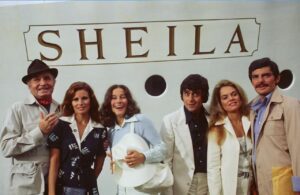
With Matthew Warchus’ Pride celebrating its first decade with a return to the big screen, we look back at what made the film’s production so special…
“It took me twenty years to find anyone to agree with me that gay and lesbian activists and a mining dispute which ended in defeat were the ingredients for a surefire commercial comedy smash.”
When Pride’s screenwriter, Stephen Beresford, took to the stage to accept the BAFTA for Outstanding Debut by a British Writer, Director or Producer, it felt like the underdog of underdog films had finally come good.
Praise had been a long time coming. Despite universal critical adoration and a fifteen-minute standing ovation at Cannes, the sense was the film never quite grabbed commercial attention in the way it deserved.
“The other day I was on a flight back from America”, Beresford told Simon Brew shortly after the BAFTAs in 2015. “The film’s now on airlines, so I did walk up and down to see if anyone was watching it, but nobody was!”
It did have some strong competition to be fair. “Mind you,” he added, “I watched Gone Girl.”
Ten years on, however, and Pride has probably faired better than its commercial rivals (it debuted third at the UK box office, behind Luke Besson’s Lucy and Laika’s charming animation, The Boxtrolls). Frequently mentioned in the same breath as British classics The Full Monty, Brassed Off and Billy Elliot, the crowd-pleasing comedy has since joined a healthy tradition of industrial action films with a heart of gold and a core of steel.
Telling the largely unknown story of a group of LGBTQ+ activists raising money for a Welsh mining town, Pride’s treatment of its huge ensemble of characters strikes a near-impossible balance between fact and fiction – despite pressure to slim the cast list down.
“There was a certain amount of financial pressure about whether we could reduce the number of characters or cut any scenes,” director Matthew Warchus said.
“Really, we bonded together in pushing back against that. We [were] committed to telling this story about large groups of people. We didn’t want to distil it down to heroes.”

That sense of the LGSM (Lesbians and Gays Support the Miners) gang as a collective, rather than exceptional individuals, remains one of Pride’s most extraordinary achievements. The unlikely hodgepodge of characters from different backgrounds helps turn an obscure true story into a universal one.
Dialogue-driven and stacked with British theatre royalty, the cast and crew’s stage roots (both Beresford and Warchus were, and still are, best-known for their work in the theatre) were evident throughout production – even if the result feels completely cinematic. Everything about the production, from rehearsals to Beresford’s heavy involvement at every stage of the process, felt more like staging a play than a feature film.
For fresh-faced young stars Ben Schnetzer and Faye Marsay, however, the first day as an ensemble brought its own challenges.
“Table reads are always a breed unto themselves,” Schnetzer told Simon. “Everybody’s insecurities are going crazy, and you’re sitting there thinking, ‘I’m going to get fired here’.”
“I remember I was sat near Andrew Scott,” Marsay added. “And I’d watched him on stage a bajillion times… I was so nervous.
“I didn’t know what to say to him… In the end, I whispered: ‘I really need a wee, do you think I can go?’ And he was like, ‘yeah, go, go go’.”

After the table read came a week-long rehearsal process – almost unheard of in the film world. After that, the eight-week shoot was conducted at lightning speed.
“We were shooting five to six, sometimes eight pages a day,” Marsay said. “It was like television.”
“We found that theatrical shorthand,” Schnetzer added.
“Matthew knew we’ve got a lot of people to cover, we don’t have much time, we’re going to cover a lot of people in the same setup, so we all need to bring it every take. We didn’t have the luxury of shooting one scene a day. We were going to be doing four or five scenes a day.”
It feels even more remarkable, then, that the end result feels so much like a traditional Hollywood story. Packed full of punch the air moments, and with a poignant ending which will bring a tear the most cynical eye, the film is a crowd-pleaser which is really best seen with a crowd.
As Pride reaches it’s tenth anniversary, then, it’s telling that Warchus’ film is getting a second, limited theatrical release in the UK. It’s in good company, too; the other repertory release this weekend is a little film called The Matrix.

But Pride’s real legacy goes far beyond the film itself. It’s one Andrew Scott put very eloquently in a chat with Entertainment Weekly at the time of its release.
“I think what this film will really help with,” he said, “is the idea that extraordinary acts of bravery and courage and kindness, however small they may be, however unnoticed they may be, do make a difference, and they are eventually noticed.
“One of the most moving things to talk about the legacy of [the film] is the real-life heroes of it, who are having such a great time with the re-emergence of the story and how much that means for them. What’s extraordinary about them is that they are all still fighting their fight.”
Read more: Pride: a funny, moving film that deserves a much bigger audience
Re-watching the film again this weekend, its message of comradery, companionship and charity feels more important than ever. We’ll let Andrew Scott have the last word:
“The idea that, actually, we have much more in common with each other than we think is something that is very comforting to me. I absolutely love the idea that this very true story has happened, and that it can be entertaining and full of heart and full of love.”
Pride is available on-demand and in select UK cinemas now.








